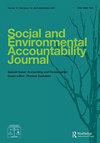“我们为之负责的世界”:罗伯·格雷作品中的系统思考
Q2 Business, Management and Accounting
Social and Environmental Accountability Journal
Pub Date : 2020-09-01
DOI:10.1080/0969160x.2020.1837641
引用次数: 5
摘要
罗布·格雷(Rob Gray)的大量知识遗产中有一个方面值得特别关注,那就是他是如何利用系统思维,以一种有意义的方式将会计和生态学联系起来的。为了庆祝他的贡献,我在这篇文章中概述了一些关于创立“绿色会计”的笔记。《皮尔斯之后的职业》(格雷,1990),在世纪之交发表了两篇论文,围绕着基本问题和他对三重底线报告的批评。本文章由计算机程序翻译,如有差异,请以英文原文为准。
‘The World for Which we Account’: Systems Thinking in Rob Gray’s Works
ABSTRACT One aspect of Rob Gray’s immense intellectual legacy that deserves particular attention is how he first connected accounting and ecology in a meaningful way, drawing on systems thinking. In celebrating his contribution, I sketch in this piece a few notes linking the founding The Greening of Accountancy. The Profession After Pearce (Gray, 1990) with two papers published in the turn of the century that revolve around the fundamental issues and his critique of triple bottom line reporting.
求助全文
通过发布文献求助,成功后即可免费获取论文全文。
去求助
来源期刊

Social and Environmental Accountability Journal
Business, Management and Accounting-Accounting
CiteScore
3.90
自引率
0.00%
发文量
16
期刊介绍:
Social and Environmental Accountability Journal (SEAJ) is the official Journal of The Centre for Social and Environmental Accounting Research. It is a predominantly refereed Journal committed to the creation of a new academic literature in the broad field of social, environmental and sustainable development accounting, accountability, reporting and auditing. The Journal provides a forum for a wide range of different forms of academic and academic-related communications whose aim is to balance honesty and scholarly rigour with directness, clarity, policy-relevance and novelty. SEAJ welcomes all contributions that fulfil the criteria of the journal, including empirical papers, review papers and essays, manuscripts reporting or proposing engagement, commentaries and polemics, and reviews of articles or books. A key feature of SEAJ is that papers are shorter than the word length typically anticipated in academic journals in the social sciences. A clearer breakdown of the proposed word length for each type of paper in SEAJ can be found here.
 求助内容:
求助内容: 应助结果提醒方式:
应助结果提醒方式:


